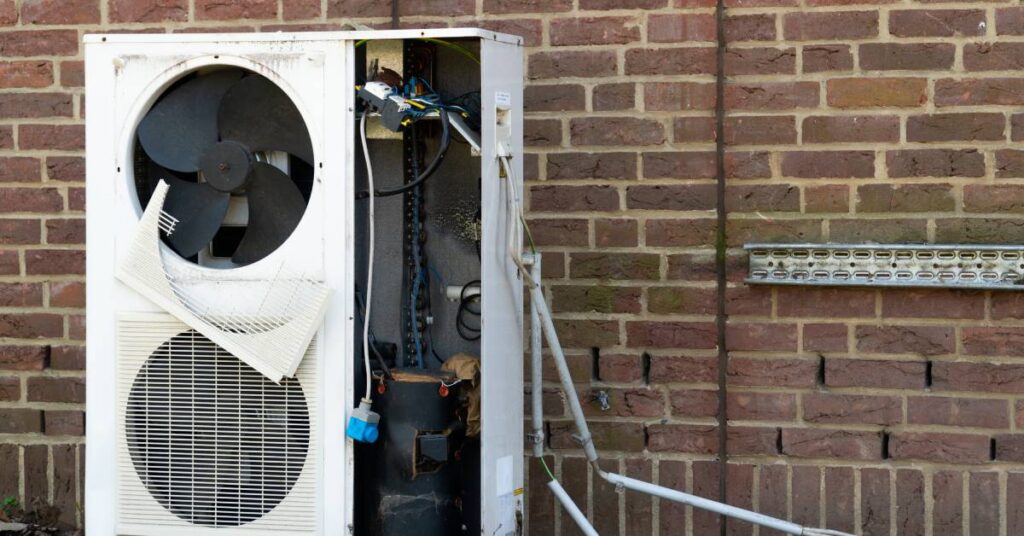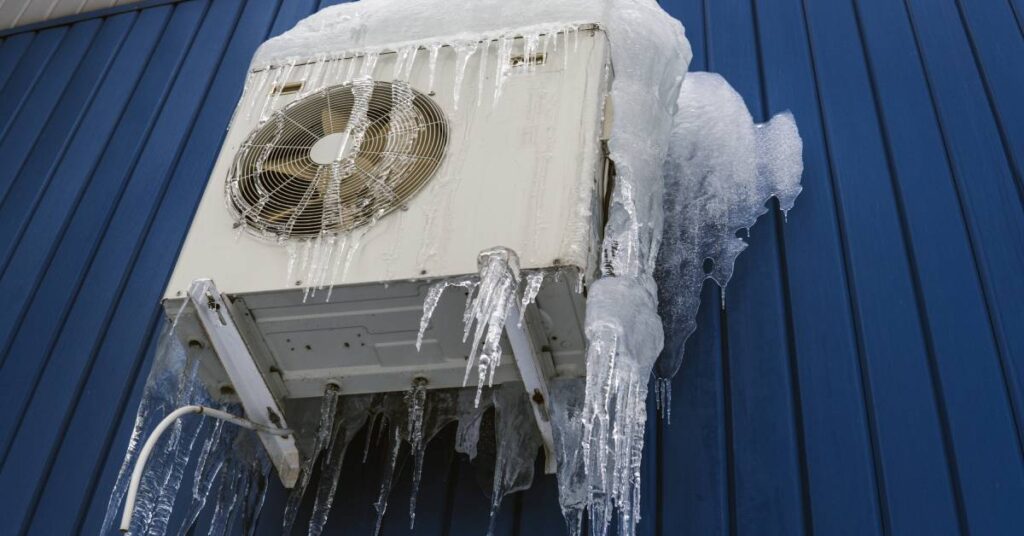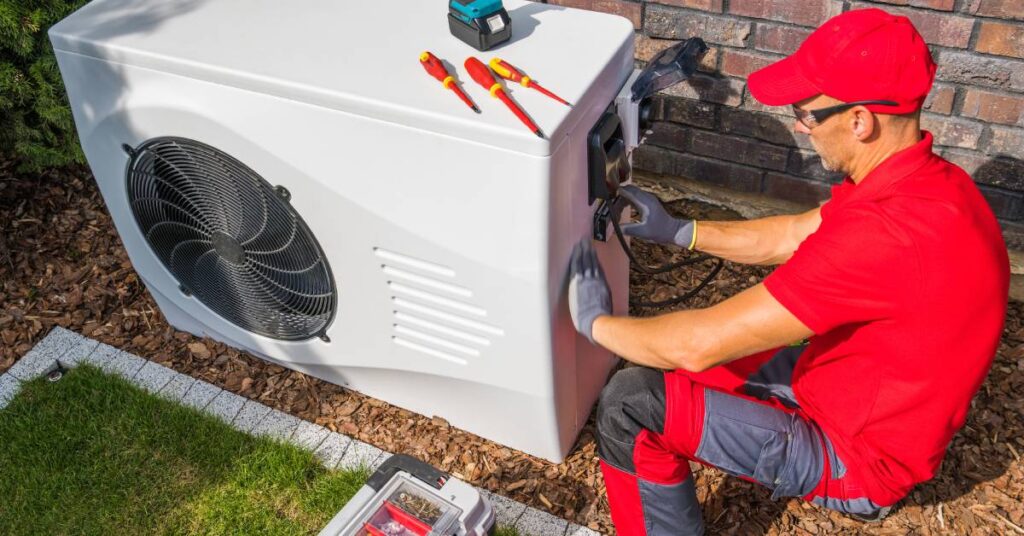- 24/7 Emergency HVAC Repair
- Financing Available
- We Accept All Major Credit Cards
11 Signs of Heat Pump Problems & What They Mean
Your heat pump keeps your home comfortable by regulating indoor temperatures. However, it may develop problems over time, affecting performance and reliability.
Identifying signs of heat pump issues and what they mean prevents costly repairs and preserves your system’s lifespan. Use this guide to learn the most common heat pump issues homeowners face, what they mean, and tips to address them.
1. Weak or Insufficient Heating/Cooling
If your heat pump is failing to provide adequate heating or cooling, it might be due to dirty filters, refrigerant leaks, or a malfunctioning thermostat. Dirty filters restrict airflow, while low refrigerant levels prevent the system from functioning properly.
Clean or replace filters and check the thermostat settings to ensure they are correct. If the issue persists, it’s best to schedule a professional inspection to diagnose and resolve the problem.
2. Unusual Noises Coming From the Unit
Rattling, buzzing, or hissing coming from the heat pump indicate underlying issues, such as loose parts, motor problems, or refrigerant leaks. These sounds indicate that the system is struggling and may lead to bigger problems if not addressed promptly.
Turn off the heat pump to prevent further damage, and inspect it for obvious issues, such as loose screws. Motor issues will worsen if rattling persists. If you can’t pinpoint the problem, contacting a professional technician is the safest option.
3. High Energy Bills Without Increased Usage
When you notice a sudden spike in your energy bill but your usage of your HVAC system hasn’t changed, the heat pump is likely working harder than normal. Worn-out components, blocked filters, or underlying maintenance issues are common culprits that may rack up energy consumption.
Check and replace the filters if they’re dirty, and make sure the heat pump has unrestricted airflow. Additionally, schedule an energy-efficiency check with an HVAC technician to pinpoint hidden problems. Tackling this now will keep your bills under control and ensure your heat pump operates smoothly.
4. Frequent Cycling On and Off
When your heat pump cycles on and off frequently, this is known as short cycling. It puts unnecessary strain on the system and reduces its lifespan. Short cycling occurs due to clogged filters, incorrect thermostat settings, or a malfunctioning compressor.
Clean or replace the filters and check that your thermostat is set to a stable temperature. If the system continues to short cycle, it’s wise to call an expert to examine the compressor or inspect for deeper mechanical problems.
5. The Outdoor Unit Freezes
Ice buildup on the outdoor unit might seem normal in winter, but excessive freezing indicates refrigerant leaks or a malfunctioning defrost cycle. A lack of heat production often accompanies this issue, stressing the system even more.
Turn off the unit and clear visible ice or debris from the outdoor unit to restore adequate airflow. Avoid chipping away ice, as this may damage the system.
Turn the fan on to blow the warm interior air over the coils to begin thawing the unit. If freezing continues, professional assistance is necessary to address underlying issues.
6. Poor Airflow From Vents
If you notice weak or uneven airflow from vents in your home, the heat pump may be dealing with clogged ductwork, blocked filters, or a failing blower motor. Obstructions in airflow cause your system to work harder, reducing its efficiency.
Begin by cleaning or replacing filters and inspecting vents or ducts for blockages. Don’t confuse the cause of this issue with improper heating or cooling! The primary issue is the heat pump’s ability to blow a stream of warm air at a set temperature. Restoring proper airflow enhances system efficiency and ensures even temperature distribution in your home.
7. Thermostat Not Responding or Misreading
A thermostat that doesn’t respond to adjustments or misreads the temperature leads to inconsistent heating and cooling in your home. This issue may stem from dead batteries, poor sensor placement, or calibration errors.
Replace the batteries and confirm that the thermostat is away from heat sources or direct sunlight, which may cause incorrect readings. If the issue persists, recalibrating the thermostat or investing in a high-quality model might resolve the problem.
8. Unpleasant or Unusual Odors
Musty, burning, or chemical smells coming from the heat pump indicate mold growth, burnt wiring, or refrigerant leaks, respectively.
Turn off the system and inspect the visible components for signs of mold growth or damaged wiring. Cleaning the system or replacing air filters might eliminate some odors, but a certified technician should handle the cause of pungent smells to restore the heat pump.
9. Leaking or Dripping Water Around Unit
Water pooling around the indoor portion of a heat pump system is typically a sign of drainage problems or frozen coils that are thawing. Standing water leads to water damage or mold growth if unresolved. Check the drain pan and pipes for clogs, and ensure the outdoor unit has adequate airflow to prevent freezing.
Clearing minor clogs might solve the issue temporarily, but consistent leaks require professional inspection to avoid long-term damage. Prompt attention saves you from repair costs and maintains your unit’s efficiency.
10. The Unit Runs Constantly Without Shutting Off
A heat pump that doesn’t stop running may signal an underlying problem, including improper sizing, refrigerant issues, or thermostat malfunctions. In older systems, continuous operation leads to skyrocketing energy bills and wears down the unit prematurely. Some newer variable-capacity systems are designed to run almost all the time at lower speeds, which actually improves efficiency and comfort.
Check the thermostat settings and lower the target temperature slightly to see if the system shuts off. If the problem persists, consult a technician to verify whether the unit is an appropriate size for your home. They can also detect and fix mechanical issues.
11. The Heat Pump Struggles in Cold Weather
While heat pumps are effective in low temperatures, a system that struggles in cold conditions might have a malfunctioning defrost cycle or compatibility issues with the climate in your area. During the winter, frost may accumulate on the outdoor coils and reduce performance.
Check whether the defrost mode is functioning, and clear away ice that’s restricting airflow. If the heat pump continues to underperform, upgrading to a cold climate-compatible model may be necessary for the best results. Staying warm in winter starts with choosing the right equipment for your home’s needs!
When To Call a Professional
While some heat pump issues are manageable with basic troubleshooting, others require immediate professional assistance. All of these problems may require professional intervention if they worsen or persist.
Contact W.F. Smith to schedule maintenance, address problems, prevent costly damage, and extend your unit’s lifespan. Our qualified heat pump specialists have the tools and expertise to restore your heat pump’s performance and efficiency.
Your heat pump is vital for maintaining indoor comfort at home, so keeping it in top condition should be a priority. Understand the signs of heat pump issues and what they mean to resolve them and save you time and money. Remember to call on us for help so your heat pump maintains its longevity and performance this winter!

W F Smith did an excellent job. Dave Smith visited out home twice to discuss installation options, and to assure our understanding of the equipment options




